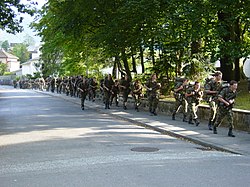Jungwakt
Jungwakt (/ʝʊŋwaçt/, Vyvlander for Youth Defence) is the name given to compulsory (and later optional) military service for young able-bodied males in Vyvland. The requirement for military service was repealed in 1995, although calls for its reinstatement have been widespread ever since. The scheme was originally employed under various disguises in North and South Vyvland to protect from the mutual threat of war between the two by training potential future soldiers, despite this threat never materialising. However, after Vyvlander reunification in 1983, the service became less essential, and was lessened in length of necessary time served and rigour of training before being finally scrapped altogether under Anhelm Ferog in 1995. The scheme has since been supported for re-introduction by many politicians and groups since its. In 2001, the scheme was brought back as an option for young people regardless of sex, although take-up has been relatively low, with many young people opting instead to stay in education, employment or training.
In its current form, Jungwakt is optional for males and females between 18 and 21, and involves four months of training with either the Vyvlander Army or Vyvlander Navy, predominantly well away from home. In the past, the period of time reached up to eight months in the North and twelve in the South, with Southern youths occasionally being deployed guarding the north-South border. unlike compulsory military service in other countries, there was no civilian alternative for those who were unable until 1969 in the North and 1983 in the South; many of those with moral objections were imprisoned for the period instead. Disabled youths were exempt from compulsory service, although in practice most with less severe disabilities enlisted to avoid social pressures and isolation. Junglegmaanzeb - the performance of voluntary and medical work in non-armed roles - was introduced in 1966 for some disabled youths in North Vyvland, and for youths with explicit approval in 1969, and expanded across the whole country upon reunification. The formal applications process for Junglegmaanzeb was abolished in 1986, and it became freely available to all who desired it.
Contemporary calls for the programme's reinstatement have focused on its perceived instilling of discipline in young people, as well as training youths, should regional conflicts arise. Politically, it is supported strongly by the National Party and some elements of the Conservative Party, who have on numerous occasions attempted to pass bills in Parliament to reinstate it. The Conservative-National coalition from 1998 to 2002 under Rikard Fegaad was responsible for reintroduction of the optional service. For at least a decade, public opinion polls have shown slim majorities being against Jungwakt's re-introduction, with support least prevalent from those with left-wing and liberal outlooks, including the Liberal Party, Greens, Socialist Party and many in the Capitalist-Libertarian Party.
